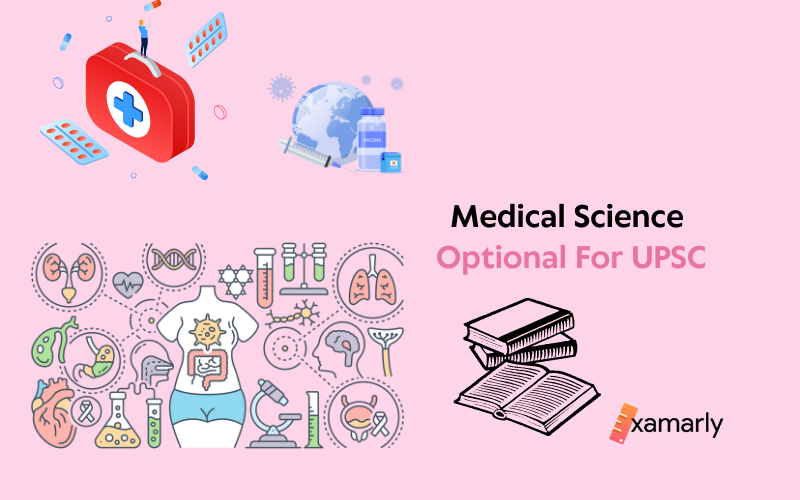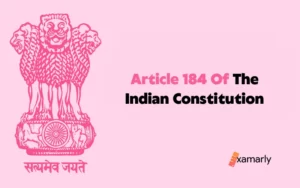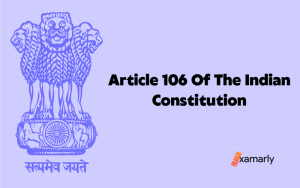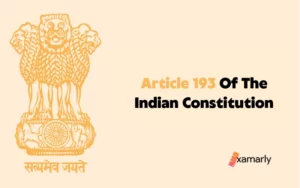The UPSC is one of the most sought-after government exams in our country. Despite its level of difficulty, each year, the most deserving candidates make it through the throng of aspirants ranging in lakhs. With great power comes great responsibility. UPSC provides the scope for the betterment of society with legitimate power and authority. In this endeavor, candidates are allowed to opt for a subject of their liking. One such optional subject is Medical Science. One can gain an in-depth understanding of the various aspects of Medical Science optional for UPSC through this article.
- Introduction To The Subject
- Comparison With Other Optional Papers
- Advantages
- Mastering The Subject From Basics
- Importance Of Academic Background
- Time Duration Required For Preparation
- Overlapping Syllabus With GS
- Help With Essay Paper
- Help In Interview
- Disadvantages
- Recent Toppers Of UPSC CSE With Medical Science Optional
- Data Available For Medical Science As Optional Subject In UPSC
- Medical Science Optional Syllabus
- Medical Science Optional Books
- Conclusion
- FAQs
Introduction To The Subject
In the Mains of the UPSC exam, Medical Science as an optional subject comprises two papers. Each of these papers carries a weightage of 250 marks. This subject could be an optional choice for candidates having a background in medical or related fields. Although the syllabus is extensive, candidates with the zeal for succeeding and the right preparation strategy clear the UPSC exam with Medical Science as their optional subject.
Since there are two optional papers to appear in, the syllabus has been segregated for Paper I and Paper II. Paper I includes Human Anatomy, Human Physiology, Pathology, Biochemistry, Pharmacology, Microbiology, and Forensic Medicine and Toxicology.
Paper II includes the topics of General Medicine, Obstetrics, and Gynaecology along with Family Planning, Pediatrics, Community Medicine, Dermatology and General Surgery.
Comparison With Other Optional Papers
Medical Science is a highly specialized optional subject just like engineering subjects. Candidates with MBBS or postgraduate degrees or having backgrounds related to the medical field are advised to choose this optional paper. This paper does not share overlapping with General Studies Paper or any other optional paper.
Advantages
Let us have a look at the benefits of opting for the Medical Science optional paper for UPSC.
- The biggest advantage is for the candidates who have a similar background as the subject. Candidates with a Medical Science background would find the syllabus familiar to what they have studied so far.
- The syllabus of this subject does not need revision. It is pretty much static.
- The questions asked are with the view of testing the clarity of the concepts of the candidate. There are mostly direct questions in this optional paper.
- This optional subject may seem tough to crack on the surface. However, one can achieve decent marks with dedication, hard work, and the correct strategy.
- Another advantage is for candidates who hold MBBS degrees. The optional subject exam is comparatively easier than the professional MBBS exam.
- BDS and BAMS graduates are also eligible to choose the Medical Science optional paper.
- Lastly, the questions of this paper have only one correct response. The answers are scientific and objective and not open to interpretation by the examiner. It is a rational subject.
Mastering The Subject From Basics
One must first learn the basics of Medical Science. It is easier to prepare for the UPSC Medical Science optional if one has previous experience learning the subject. However, this subject can be challenging and tiring if not prepared well. The best way to prepare is to read the relevant content thoroughly. This way, the candidate will build the confidence to face the exam without any fear.
Studying the topic properly is also essential as the questions in UPSC CSE subjects are a mix of theory and application. One cannot rely on theory study alone to arrive at the correct diagnosis or suggest the correct line of treatment. They must have experience in dealing with patients to apply the knowledge that they learn.
Importance Of Academic Background
The syllabus for this optional paper is very comprehensive and vast. It is often difficult for students to tackle it without some medical background. However, this is not a problem for those who have studied BAMS or BDS. Besides, the questions in this subject are direct and conceptual. This means that it is easy to do well in this subject if one has an academic medical background.
Time Duration Required For Preparation
As such, there does not exist any fixed duration that is required for the preparation of the Medical Science optional paper. Since the syllabus is quite vast, having an academic background similar to that of the medical field is a definite advantage. This is because the candidate would have studied the subject for about 5 years and has knowledge of the syllabus as it is a familiar subject.
Overlapping Syllabus With GS
The Medical Science optional subject does not have any overlapping syllabus with the General Studies paper.
Help With Essay Paper
The essay paper in UPSC usually covers topics related to democracy, judiciary, philosophies, education, environment, urbanization, social justice, poverty, economic sector, character, administration, media and society, Indian culture and society, etc. Since medical science is a specialized field, it does not directly contribute to the essay paper. However, a solid understanding of the optional paper is a must for every candidate.
Help In Interview
In UPSC, the interview process is a good way to check the candidate’s general awareness, mental capabilities, social etiquette, and general personality. It does not solely focus on one’s theoretical knowledge. During the interview, the interviewer looks for soft skills and logical questions. Having said that it is always advisable to have sound knowledge and a steady grasp of one’s optional subject.
Related – Management Optional Syllabus For UPSC
Disadvantages
There are some drawbacks to the Medical Sciences optional subject. These are as follows :
- Firstly, the syllabus is quite vast to be covered in a limited time duration. Covering the syllabus is quite a challenge in itself, aside from the complex nature of the subject.
- Secondly, there are no common topics in the General Studies papers and this optional subject. Hence, there is no scope for overlapping the syllabus.
- Lastly, with subjects such as this, the outcome is heavily dependent on the interest and dedication of the candidate. At times the focus of the candidate may be hindered if they do not possess a genuine interest in the subject.
Recent Toppers Of UPSC CSE With Medical Science Optional
Over the years, candidates with Medical Science as their optional subject have successfully cleared the UPSC exam with flying colors. The following table lists the toppers with Medical Science optional for UPSC CSE.
| Name of candidate | Year | Rank |
| Anshu Priya | 2021 | 16 |
| Diksha Joshi | 2021 | 19 |
| P.Srija | 2020 | 20 |
| Rajesh K Mohan | 2020 | 102 |
| Gopal Krishna | 2017 | 265 |
| Nidhi Patel | 2017 | 364 |
| Artika Shukla | 2015 | 4 |
| Shrikrishnanath B Panchal | 2015 | 16 |
| Vipin Garg | 2015 | 20 |
| Vinay Goyal | 2015 | 79 |
| Khushaal Yadav | 2014 | 28 |
| Bharti Dixit | 2013 | 5 |
| Roman Saini | 2013 | 18 |
| Shaleen | 2011 | 81 |
| Shah Faesal | 2009 | 1 |
Data Available For Medical Science As Optional Subject In UPSC
The total number of candidates who choose Medical Science as their optional paper has seen a rise over the years. The average number of candidates per year is about 300. This subject boasts a success rate close to 20%. As per the data available, the success rate of Medical Science optional has been compiled into a table.
| Year | No. of candidates appeared | No. of candidates cleared | Success Rate (%) |
| 2017 | 313 | 32 | 10.2 |
| 2015 | 327 | 66 | 20.2 |
| 2014 | 356 | 71 | 19.9 |
| 2013 | 293 | 48 | 16.4 |
| 2012 | 235 | 55 | 23.4 |
| 2011 | 205 | 48 | 23.4 |
| 2010 | 149 | 28 | 18.8 |
Medical Science Optional Syllabus
Medical Science is one of the most preferred optional papers by candidates with a medical background. To score well, one must be familiar with the syllabus of the Medical Science optional paper. A clear understanding of the syllabus helps in strategic preparation for the exam.
Medical Science Optional Syllabus Paper I:
1. Human Anatomy
(i) Applied anatomy including blood and nerve supply of upper and lower limbs and joints of shoulder, hip and knee.
(ii) Gross anatomy, blood supply and lymphatic drainage of tongue, thyroid, mammary gland, stomach, liver, prostate, gonads, and uterus.
(iii) Applied anatomy of diaphragm, perineum, and inguinal region.
(iv) Clinical anatomy of kidney, urinary bladder, uterine tubes, vas deferens.
(v)Embryology: Placenta and placental barrier. Development of heart, gut, kidney, uterus, ovary, testis, and their common congenital abnormalities.
(vi) Central and Peripheral Autonomic Nervous System: Gross and clinical anatomy of ventricles of brain, circulation of cerebrospinal fluid; Neural pathways and lesions of cutaneous sensations, hearing and vision; Cranial nerves distribution and clinical significance; Components of autonomic nervous system.
2. Human Physiology
(i) Conduction and transmission of impulse, mechanism of contraction, neuromuscular transmission, reflexes, control of equilibrium, posture and muscle tone, descending pathways, functions of cerebellum, basal ganglia, Physiology of sleep and consciousness.
(ii) Endocrine System: Mechanism of action of hormones; formation, secretion, transport, metabolism, function and regulation of secretion of pancreas and pituitary gland.
(iii) Physiology of Reproductive System: Pregnancy menstrual cycle, lactation, pregnancy.
(iv) Blood: Development, regulation, and fate of blood cells.
(v) Cardio-vascular, cardiac output, blood pressure, regulation of cardiovascular functions.
3. Biochemistry
(i) Organ function tests—liver, kidney, thyroid Protein synthesis.
(ii) Vitamins and minerals.
(iii) Restriction fragment length.
(iv) Polymorphism (RFLP).
(v) Polymerase chain reaction (PCR)
(vi) Radio-immunoassays (RIA).
4. Pathology
Inflammation and repair, disturbances of growth and cancer, Pathogenesis and histopathology of rheumatic and ischaemic heart disease and diabetes mellitus. Differentiation between benign, Government strives to have a workforce which reflects gender balance and women candidates are encouraged to apply malignant, primary and metastatic malignancies, Pathogenesis and histopathology of bronchogenic carcinoma, carcinoma breast, oral cancer, cancer cervix, leukemia, Etiology, pathogenesis and histopathology of—cirrhosis liver, glomerulonephritis, tuberculosis, acute osteomyelitis.
5. Microbiology
(i) Humoral and cell-mediated immunity.
(ii) Diseases caused by and laboratory diagnosis of:
• Meningococcus, Salmonella
• Shigella, Herpes, Dengue, Polio
• HIV/AIDS, Malaria, E. Histolytica, Giardia
• Candida, Cryptococcus, Aspergillus.
6. Pharmacology
Mechanism of action and side effects of the following drugs:
• Antipyretics and analgesics, Antibiotics,
• Antimalaria, Antikala-azar, Antidiabetics,
• Antihypertensive, Antidiuretics, General and cardiac vasodilators,
Antiviral, Antiparasitic, Antifungal, Immunosuppressants
• Anticancer
7. Forensic Medicine and Toxicology
Forensic examination of injuries and wounds; Examination of blood and seminal stains; Poisoning, sedative overdose, hanging, drowning, burns, DNA and fingerprint study.
Medical Science Optional Syllabus Paper II:
1. General Medicine
(i) Etiology, clinical features, diagnosis and principles of management (including prevention) of—Typhoid, Rabies, AIDS, Dengue, Kala-azar, Japanese Encephalitis.
(ii) Etiology, clinical features, diagnosis and principles of management of: Ischaemic heart disease, pulmonary embolism.
(iii) Bronchial asthma.
(iv) Pleural effusion, tuberculosis, Malabsorption syndromes; acid peptic diseases, Viral hepatitis and cirrhosis of liver.
(v) Glomerulonephritis and pyelonephritis, renal failure, nephrotic syndrome, renovascular hypertension, complications of diabetes mellitus, coagulation disorders, leukemia, Hypo and hyperthyroidism, meningitis and encephalitis.
(vi) Imaging in medical problems, ultrasound, echo- cardiogram, CT scan, MRI
(vii) Anxiety and Depressive Psychosis and schizophrenia and ECT.
2. Paediatrics
Immunization, Baby friendly hospital, congenital cyanotic heart disease, respiratory distress syndrome, broncho— pneumonias, kernicterus. IMNCI classification and management, PEM grading and management. ARI and Diarrhea of under five and their management.
3. Dermatology
Psoriasis, Allergic dermatitis, scabies, eczema, vitiligo, Stevan Johnson’s syndrome, Lichen Planus
4. General Surgery
(i) Clinical features, causes, diagnosis and principles of management of cleft palate, harelip.
(ii) Laryngeal tumour, oral and esophageal tumours
(iii) Peripheral arterial diseases, varicose veins, coarctation of aorta.
(iv) Tumours of Thyroid, Adrenal, Glands.
(v) Abscess cancer, fibroadenoma and adenosis of breast.
(vi) Bleeding peptic ulcer, tuberculosis of bowel, ulcerative colitis, cancer of the stomach.
(vii) Renal mass, cancer prostate.
(viii) Haemothorax, stones of Gallbladder, Kidney, Ureter and Urinary Bladder.
(ix) Management of surgical conditions of Rectum, Anus and Anal canal, Gall bladder and Bile ducts.
(x) Splenomegaly, cholecystitis, portal hypertension, liver abscess, peritonitis, carcinoma head of pancreas.
(xi) Fractures of spine, Colles’ fracture and bone tumors.
(xii) Endoscopy
(xiii) Laparoscopic Surgery.
5. Obstetrics and Gynaecology including Family Planning
(i) Diagnosis of pregnancy
(ii) Labour management, complications of 3rd stage, Antepartum and postpartum hemorrhage, resuscitation of the newborn, Management of abnormal life and difficult labour. Management of small for date or premature newborn.
(iii) Diagnosis and management of anemia. Preeclampsia and Toxemia of pregnancy, Management of Post- menopausal Syndrome.
(iv) Intrauterine devices, pills, tubectomy and vasectomy. Medical termination of pregnancy including legal aspects.
(v) Cancer cervix.
(vi) Leucorrhoea, pelvic pain; infertility, dysfunctional uterine bleeding (DUB), amenorrhoea, Fibroid and prolapse of uterus.
6. Community Medicine (Preventive and Social Medicine)
(i) Principles, methods, approach and measurements of Epidemiology.
(ii) Nutrition, nutritional diseases/disorders and Nutrition Programmes.
(iii) Health information Collection, Analysis and Presentation
(iv) Objectives, components and critical analysis of National programmes for control/eradication of : Malaria, Kala-azar, Filaria and Tuberculosis, HIV/AIDS, STDs and Dengue.
(v) Critical appraisal of Health care delivery system
(vi) Health management and administration; Techniques, Tools, Programme Implementation and Evaluation.
(vii) Objectives, Components, Goals and Status of Reproductive and Child Health, National Rural Health Mission and Millennium Development Goals.
(viii) Management of hospital and industrial waste.
Medical Science Optional Books
No exam preparation is complete without supplementary help from the right sources. The following is a list of standard reference books for the preparation of Medical Science Paper I :
- Human Anatomy—B D Chaurasia
- Embryology from I B Singh;
- Human Physiology– Ganong; Guyton and A.K. Jain book
- Biochemistry– by U. Satyanarayana book.
- Pathology– Robbins, and Cotran
- Textbook of Pathology- Harsh Mohan
- Essentials of Medical Pharmacology-K D Tripathi
- Illustrated Reviews Pharmacology -Lippincott
- Microbiology– D R Arora
- Medical Parasitology- D R Arora
- Ananthanarayan and Paniker’s Textbook of Microbiology
- Essentials of Forensic medicine and Toxicology- Dr. K S Narayan Reddy
- Park Textbook of Preventive and Social Medicine- K Park
In addition to the previous list, here is a list of books for Medical Science Paper II:
- General Medicine textbook of medicine- S N Chugh
- Medicine: Prep Manual for Undergraduates- George Mathews
- Emergency medicine- S N Chugh.
- Manipal Manual of Surgery- K. Rajgopal Shenoy
- Clinical Surgery- S Das.
- Pediatrics– Essential pediatrics by O P Ghai, Paul and Bagga.
- Practical Aspects Of Pediatrics- Dr. Mayoor K Chheda
- Illustrated Synopsis of Dermatology and Sexually Transmitted Diseases- Dr. Neena Khanna.
- Textbook Of Obstetrics-D.C. Dutt
See Also – Medical Science Books
Conclusion
Medical Science, as data suggests is opted for by more than 100 candidates each year. The optional paper also holds the credit for having one of the highest percentages of success. Over the years, this number has seen an increase.
It has its own set of pros and cons. It would become problematic if the candidate desires to overlap with the General Studies papers. Although Medical Science optional constitutes a vast syllabus, it can fetch highly rewarding optional marks for candidates with academic backgrounds related to the medical field. There are plenty of toppers with Medical Science as optional in UPSC.
In the end, it all depends on sincerity, dedication, keenness to learn, planning, and preparation strategy adopted by the candidate.
FAQs
How many papers are there in medical science optional for UPSC?
There are two medical science optional papers for UPSC, Paper I and Paper II.
Is it necessary for MBBS students to opt for medical science optional for UPSC?
Optional paper is the choice of subject of the candidate that they feel confident in. It does not necessarily mean that a candidate with medical background must choose subjects related to medical science. The candidate can decide to take up any optional subject that they have an interest in.
What is the success rate of medical science optional for UPSC?
By analyzing the available data from 2010-2017, it can be concluded that the success rate of medical science optional for UPSC ranges between 10.2% to 23.4%.






